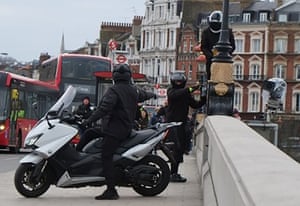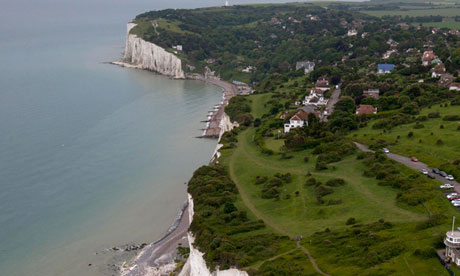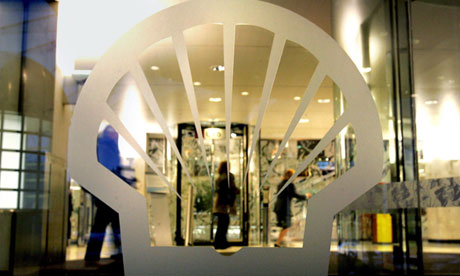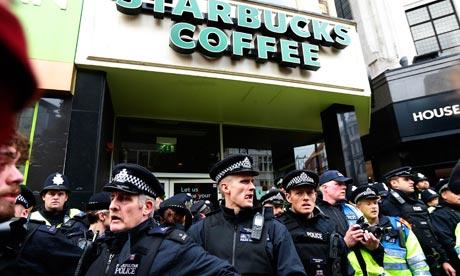Who rules the underworld today, and where do they conduct their business? Once there were the familiar mugshots and Runyonesque nicknames, the clubs and pubs where the usual suspects gathered, plotted and schemed. Now organised crime is run like any other business, and its leading figures look like every other broker or tycoon. We have entered into a world of what Sir Rob Wainwright, until recently Europe’s most senior police officer, calls “anonymised” crime. The underworld has become the overworld.
The National Crime Agency has estimated that £90bn of criminal money is being laundered through the UK every year, 4% of the country’s GDP. London has become the global capital of money-laundering and the beating heart of European organised crime. English is now the international underworld’s lingua franca. Crime is an essential part of the British economy, providing hundreds of thousands of jobs, not just for professional criminals – the NCA reckons there are 4,629 organised crime groups in operation – but for police and prison officers, lawyers and court officials, and a security business that now employs more than half a million people.
Just as the names of familiar shops have been departing from the high street, the old family firms of criminals are disappearing, whether in London, Glasgow, Newcastle or Manchester. And just as British football fans have had to learn how to pronounce the names of the legions of new foreign players, detectives have had to learn to do the same for the increasing number of new criminals. Britain was once dealing with drugs imports from half a dozen countries; now it is more than 30. A young person who would in the past have sought an apprenticeship in a trade or industry may now find that drug dealing offers better career prospects. And, apart from drugs and guns, British trading channels now facilitate the trafficking of women from eastern Europe and Africa for prostitution and children from Vietnam as low-level drug workers.
The underworld’s modus operandi has shifted in the past quarter century. “The international nature of crime and technology are probably the two biggest changes,” says Steve Rodhouse, the NCA’s head of operations. Speaking at the NCA’s unprepossessing headquarters in Vauxhall, south London, Rodhouse explains how the agency’s work has mushroomed. “Pretty much all of the NCA’s most significant ‘high-harm’ operations now involve people, commodities or money transferring across international borders. The days of having a drugs gang, a firearms gang or a people-trafficking gang have changed because of the concept of polycriminality. Groups satisfying criminal markets, whatever they may be, is now much more common. These are businesses and people are looking to exploit markets, so why confine yourself to one market?”
Wainwright, who served as Europol chief for nine years, has also noted this internationalisation of crime. Addressing a Police Foundation gathering just after his retirement last year, he said that Europol, the European equivalent of Interpol, having expanded since its foundation in 1998 when “it consisted literally, of two men and a dog – admittedly, a sniffer dog – in Luxembourg,” now dealt with 65,000 cases a year. By 2018, he reckoned that 5,000 organised crime groups were operating across Europe and the mafia model had been replaced by a “more nimble” model, with 180 different nationalities operating, mixing legal with illegal business and working with between 400 and 500 major money-launderers. This was multinational business with specialists in recruitment, movement, money-laundering and the forging of documents.
The internet, of course, is a major factor. Wainwright likened its effect on crime to that of the motorcar in the 1920s and 30s, when suddenly criminals could escape at speed and take advantage of new markets. He cited the dark web, which he said was selling 350,000 different illegal items – 60% of which were drugs – but including everything from guns to pornography and even operating a ratings system for speed of dispatch and quality. The combination of new faces of whom the British police – and often Interpol and Europol – were unaware, along with an increasingly tech-savvy pool of criminals able to disguise their identities, made for a toxic cocktail. Crooks anonymous.
One group with little interest in anonymity are the Hellbanianz, a gang of cocky young Albanians based in Barking, east London. They went online in spectacular fashion in 2017 via Instagram and YouTube rap videos to flaunt their ill-gotten wealth and firepower.
Their most prominent member, Tristen Asllani, who lived in Hampstead, was jailed for 25 years in 2016 for drug dealing and firearms offences which included possessing a Škorpion submachine gun. He was caught after a police chase in north London which ended when he crashed his car into a computer repair shop in Crouch End. A photo of Asllani, showing him stripped to the waist after he had apparently spent long hours in the prison gym, appeared on a social media page called My Albanian in Jail, with a caption saying “Even inside the prison we have all conditions, what’s missing are only whores”.
The flashy cars and bundles of banknotes on display in the Hellbanianz videos were the result of the importation of cocaine and cannabis, but the gang was also involved in the weapons trade. The pictures showed £50 notes wrapped around a cake and their HB logo written in cannabis. After they were arrested and jailed, other gang members have posted pictures of themselves, taken with smuggled mobile phones, from inside prison where they cheerfully inscribe their gang name on the walls.
Muhamed Veliu, an Albanian investigative journalist, who knows London well, says that the Hellbanianz have been on the crime scene in east London for many years. “They are sending a bad message to young Albanians. By seeing such photos, they think the streets of UK are paved with gold … Bizarrely, despite the fact they are in the prison, they show the outside world photos of their life behind the bars.” He said that there was a concern that the British media stereotyped all Albanians as criminals but, he added, the 2006 Securitas robbery, in which two Albanians played key roles in the theft of £53m from a depot in Kent, was regarded with some national pride back home. “It was ‘the crime of the century’, it was seen as very different from making money from prostitution, which is the lowest form of crime. It is wrong, of course, but they did need bravery to get involved, and at least they went for a bank – that was the feeling in the Albanian community.” There are currently around 700 Albanians in British jails.
“Albania is Europe’s largest producer of cannabis,” says Tony Saggers, the former head of drugs threat and intelligence at the NCA. “It is important not to stereotype, but the Kosovan war led to Albanians pretending to be Kosovan in order to get asylum in the UK. Many of the people who came just wanted a better life, but there were criminals among them who were able to set up illicit networks … The UK criminal has a get-rich-quick mentality while the Albanians’ strategy was get-rich-slow, so they have driven down the price of cocaine in the UK. They knew that if they expanded, they could undercut the market.” It helped that their reputation preceded them. “The Albanian criminals may be ruthless and potentially murderous when controlling their organised crime,” said Saggers, “but when they come to the UK they try to be more charismatic and they use fear – ‘We’re here, we need to get on,’ that sort of approach. So there is little violence from the older Albanian criminals in the UK, because they know that violence attracts more attention.”
The Albanians had already established themselves in a darker fashion when 26-year-old Luan Plackici was jailed in 2003 and said to have made more than £1m from trafficking “poor, naive and gullible” young women who thought they were on their way to jobs as waitresses or barmaids. Some had to service up to 20 men a day to pay for the £8,000 “travel bill” from Romania and Moldova.
The international nature of people-trafficking was exposed fully in 2014 by a trial of a gang that imported more than 100 women into Britain. The trial ended with the gang leader, Vishal Chaudhary, being jailed for 12 years. Chaudhary, who lived the high life in Canary Wharf in London, contacted young women through social networks in Hungary, the Czech Republic and Poland, offering work as receptionists, nannies or cleaners in England. But when they got to the UK, the women were forced to work in brothels. Chaudhary’s team, all of whom were jailed, consisted of his brother, Kunal, who worked for Deloitte in Manchester, a Hungarian heavy called Krisztian Abel and the latter’s sister, Szilvia, who helped recruit the women.
A cannabis farm discovered in a house in Oldham in 2013. Photograph: Christopher Thomond/The Guardian
There are numbers of young people involved in what the legal system terms “forced criminality”. The lawyer Philippa Southwell has specialised in such cases, which apply in particular to young Vietnamese people brought illegally into the UK by traffickers and forced to work in cannabis farms to pay back debts of up to £30,000 that their parents have undertaken in order for them to have a new life in Europe.
“The modus operandi of criminal organisations is to target children or young adults, trafficking them across the world in a journey that can take months,” Southwell says. “Those being trafficked from Vietnam, often transit via Russia, Germany and France, by boat, lorry and even by foot. Once at their destination, they will be locked in a premises and made to tend the cannabis plants, by watering them and ensuring the lighting is on. These cannabis grows are sophisticated multi-million-pound drug operations, with the electricity often being extracted illegally and high-value equipment used. The windows of the buildings may be nailed shut. The farms normally operate in rural areas where the chance of detection is reduced.”
The boys and young men were in a form of debt bondage, but no matter how hard they worked, their debt never seemed to be paid off. “There is a misconception within the criminal justice system that they are free to leave because the doors may not always be locked,” says Southwell, “but the reality is that they have nowhere to go – they are controlled through threats of violence, debt bondage, isolation, fear and other complex control methods that are regularly used by traffickers.”
From the Chinese opium dealers in the 1920s, the Italian gangsters in the 30s, the Maltese pimps in the 50s, the West Indian Yardies in the 60s, the Turkish heroin dealers in the 70s to the east Europeans gangsters and Nigerian fraudsters today, there has long been an unfair tendency to blame foreigners as dominant figures in the underworld. While they may have all had their parts to play, the homegrown British villain – whether artful dodger or ruthless kingpin – has always been the bedrock of the underworld.
“Everyone wants to be a gangster,” says BX, a young former gang member from north-west London. “Everyone’s seen it on TV and that’s what they want to be. They look at music videos and it looks like the people in them are making hundreds of thousands of pounds, although the reality is that they are still living at their mum’s house. Most of them come from estates and they see their parents going to work, struggling to pay the bills. They come home, their mum’s not there, and all the places where kids could play are closing down. Nine times out of 10, they leave school without qualifications. So if you’re broke, if you can’t get a job, you’re going to take the opportunity. My parents had no clue what I was up to – I didn’t come back with any marks on my face.”
The recent upsurge in knife attacks has focused attention on gangs. At one stage last year, there were six separate knife murder trials underway at the Old Bailey, all gang-related, all involving more than one defendant, none older than 22. “It’s not a black thing, it’s not a white thing, everyone’s doing it,” says BX. “There’s no: ‘I’m black, he’s white, we can’t get along’ any more.” There were still ample opportunities for smaller-time dealers: “You can make a grand a week.”
There are numbers of young people involved in what the legal system terms “forced criminality”. The lawyer Philippa Southwell has specialised in such cases, which apply in particular to young Vietnamese people brought illegally into the UK by traffickers and forced to work in cannabis farms to pay back debts of up to £30,000 that their parents have undertaken in order for them to have a new life in Europe.
“The modus operandi of criminal organisations is to target children or young adults, trafficking them across the world in a journey that can take months,” Southwell says. “Those being trafficked from Vietnam, often transit via Russia, Germany and France, by boat, lorry and even by foot. Once at their destination, they will be locked in a premises and made to tend the cannabis plants, by watering them and ensuring the lighting is on. These cannabis grows are sophisticated multi-million-pound drug operations, with the electricity often being extracted illegally and high-value equipment used. The windows of the buildings may be nailed shut. The farms normally operate in rural areas where the chance of detection is reduced.”
The boys and young men were in a form of debt bondage, but no matter how hard they worked, their debt never seemed to be paid off. “There is a misconception within the criminal justice system that they are free to leave because the doors may not always be locked,” says Southwell, “but the reality is that they have nowhere to go – they are controlled through threats of violence, debt bondage, isolation, fear and other complex control methods that are regularly used by traffickers.”
From the Chinese opium dealers in the 1920s, the Italian gangsters in the 30s, the Maltese pimps in the 50s, the West Indian Yardies in the 60s, the Turkish heroin dealers in the 70s to the east Europeans gangsters and Nigerian fraudsters today, there has long been an unfair tendency to blame foreigners as dominant figures in the underworld. While they may have all had their parts to play, the homegrown British villain – whether artful dodger or ruthless kingpin – has always been the bedrock of the underworld.
“Everyone wants to be a gangster,” says BX, a young former gang member from north-west London. “Everyone’s seen it on TV and that’s what they want to be. They look at music videos and it looks like the people in them are making hundreds of thousands of pounds, although the reality is that they are still living at their mum’s house. Most of them come from estates and they see their parents going to work, struggling to pay the bills. They come home, their mum’s not there, and all the places where kids could play are closing down. Nine times out of 10, they leave school without qualifications. So if you’re broke, if you can’t get a job, you’re going to take the opportunity. My parents had no clue what I was up to – I didn’t come back with any marks on my face.”
The recent upsurge in knife attacks has focused attention on gangs. At one stage last year, there were six separate knife murder trials underway at the Old Bailey, all gang-related, all involving more than one defendant, none older than 22. “It’s not a black thing, it’s not a white thing, everyone’s doing it,” says BX. “There’s no: ‘I’m black, he’s white, we can’t get along’ any more.” There were still ample opportunities for smaller-time dealers: “You can make a grand a week.”

An organised gang carrying out robberies on scooters in London in 2018. Photograph: MET Police
The hierarchy of gangs remained a key factor. “If you’re a drug dealer, you have to find people who will do your dirty work for you. The way it works is the elders, who are, say, 24 or 25, they see you doing well, so they might take you under their wing. The young kids acting as look-outs, they’re thinking: ‘I’m part of that guy’s enterprise. That could be me in however many years, I could get promotion.’ As they say, loyalty brings forth royalty.”
Territory is important commercially. “If you’re doing five keys (kilos) a week and then suddenly you’re only doing three a week, it doesn’t take long to realise that someone’s out there taking your customers. So you have to eliminate the opposition. How do you do that? By either taking them out, or tipping off the police. You are never supposed to snitch, but I know one guy, from Southall, who’s a millionaire now; he was in competition with a guy from the same area so he informed the police.” There’s a not-unfounded suspicion that some informers have continued to commit crimes while under police protection. “All the old-school rules – they’re gone. I know people who work with the police to get immunity for themselves. I know one who everyone knows works with the police, he’s even been shooting people, but you type his name into Google you won’t find anything about him and, believe me, his record is way longer than my arm.”
The risks are high. “Of the people I grew up with, only three of us haven’t been to jail, although I’ve been arrested many times. My older brother has been in and out of jail – nine months here, six weeks there. But there are less police than ever, so that gives you the incentive, and even if you get arrested, you’re not going to do that long.”
While the young gangs have largely replaced the old family-based crews, so have young, helmeted, scooter-riding robbers smashing their ways into jewellers and mobile phone shops taken on the role of the old sawn-off shotgun-wielding bank robbers.
While those smalltime home-grown villains may still thrive, an increasing number of members of the British underworld have followed old imperial traditions and headed abroad to cut out the middle-man, establishing themselves not only in the traditional bolt-hole of Spain, but in the Netherlands, Thailand and South Africa. The person who was to rewrite the rulebook on drug dealing is the street-smart Liverpudlian Curtis Warren, better known by his nicknames Cocky or the Cocky Watchman. Born in 1963, his criminal career started at the age of 12 with a conviction for car theft. By 16, he was on his way to borstal for assaulting the police. Other offences followed, but it was only when he moved into the drugs business, working out of Amsterdam, that he established his reputation as one of the most prolific traffickers of modern times – Interpol’s “Target One” and the subject of a joint British–Dutch investigation codenamed Operation Crayfish.
While Warren’s move to Amsterdam, where fellow British dealers also established themselves, seemed like a smart idea in that he was less exposed to the British police, it was also a weakness, because the Dutch authorities were able to tap his phone without restriction and secure the evidence they needed. (Although they also required English help in translating Liverpudlian for them.) In October 1996, police in the Netherlands seized 400kg of cocaine, 60kg of heroin, 1,500kg of cannabis, handguns and false passports. Nine Britons and a Colombian were arrested, and Warren was soon portrayed as the biggest fish in the net. He was jailed for 12 years for a conspiracy to import what was claimed to be £125m of drugs into Britain. The Observer suggested he was “the richest and most successful British criminal who has ever been caught”, and he was the only drug dealer to make it on to the Sunday Times rich list. T-shirts with an old mugshot of Warren on them were still for sale in Liverpool 20 years after Operation Crayfish.
After his release from jail in the Netherlands in June 2007, Warren was only a free man for five weeks. He headed to Jersey, but was under constant surveillance and soon arrested. In 2009, he was convicted of conspiring to import £1m of cannabis into Jersey and jailed for 13 years. Warren was alleged to have invested his wealth in everything from petrol stations to vineyards, football clubs to hotels. A Jersey court ordered him to pay £198m after he failed to prove his business empire was not built on the proceeds of cocaine trafficking. Detectives had secretly recorded him boasting during a 2004 prison visit of funnelling huge amounts of cash via a money launderer. “Fuckin’ ’ell, mate, sometimes we’d do about £10m or £15m in a week,” he told some of his visitors. “I was bragging like an idiot and just big-talking in front of them,” was Warren’s explanation later. The Jersey attorney general, Timothy Le Cocq QC, described him as “one of Europe’s most notorious organised criminals”. His failure to pay the money resulted in a further 10 years’ jail time.
He told Guardian journalist Helen Pidd, when she interviewed him in jail in Jersey, that he disapproved of drugs: “I’ve never had a cigarette in my life or a drink. I’ve never tasted alcohol or anything. No interest.” His ambition after he was freed was to leave England – “and never come back”. He added: “I just wish I’d not been such a worry to me mum.”
Few people were better qualified to comment on Warren than former NCA man Tony Saggers, who was an expert witness in Warren’s trial and proceeds hearing. “Curtis Warren was a forerunner,” he said. “You get people like him who come from a tough background, a council-house environment, and he had a sort of bare-faced courage in some respects, to put himself in places like Venezuela and Colombia, which were probably even more dangerous then than they are now. He put himself at the other end of the supply chain, and in a way established that pattern for the elite drug trafficker. But nowadays, high-level, high-profile criminals play less and less of a role, and make use of others below them in a detached way.”
Other British criminals have also cast their nets wide during the past two decades. One of the best-known was Brian Wright, once one of Britain’s most active cocaine smugglers, who was nicknamed The Milkman – because he always delivered. He operated from both Turkish-controlled Northern Cyprus and Spain. In 1998, he was alleged to have imported almost two tonnes of the drug, with the result, according to one customs investigator, that “the cocaine was coming in faster than people could snort it”. The Dublin-born Wright owned a villa near Cadiz, which he named El Lechero – the Spanish for milkman – and had a box at Ascot, a flat in Chelsea’s King’s Quay and used some of his proceeds to fix races on which he then bet, thus laundering his drug profits. Finally arrested in Spain, he was brought back to England and, in 2007, at the age of 60, found guilty at Woolwich crown court of conspiracy to supply drugs and jailed for 30 years.
Some very successful scams have been perpetrated on elderly Britons. John Palmer, who had been involved in the Brink’s-Mat bullion robbery (from whence he got his nickname “Goldfinger”) made his fortune in a crooked timeshare business in Tenerife. A ruthless operator, he took advantage of thousands of gullible souls, many of them elderly holidaymakers, who believed his spiel about the fortunes they could make by investing in timeshare apartments that were never built. Outwardly, he appeared to have it all: the yacht, the cars with the personalised number plates, dozens of properties. He even made it to No 105 in the Sunday Times rich list. “Remember the golden rule,” was the motto he loved to quote, “he who has the gold makes the rules.” But in 2001, he was convicted of a timeshare fraud in which 16,000 victims lost an estimated £33m and served eight years in prison.
Then, in 2015, Palmer was shot dead by a hitman in his garden in Essex. There were rumours that he was killed because he might have been cooperating with the Spanish police over another fraud case. His co-accused were convicted in Spain in May this year and the police in Britain have duly issued a fresh appeal for help to find his killer – with a reminder that there is a £100,000 reward on offer in case that tempts an elderly underworld grass.
Any notion that Spain might still be a safe haven for expat criminals was dispelled in 2018 when Brian Charrington – a close associate of Curtis Warren and regarded as one of the major international drug dealers of his generation – was jailed for 15 years for trafficking and money-laundering in Alicante in 2018. Described in the Spanish press as “el narco que escribia en Wikipedia”, because of his reputation for updating and correcting his Wikipedia entry, the former car-dealer from Middlesbrough had been arrested in 2013 at his villa in Calpe, on the Costa Blanca, an area where some estate agents offer bulletproof glass as a special feature along with the spa bath and barbecue area. There had been wild rumours of crocodiles in his swimming pool, but disappointingly, the police found none.
Charrington was alleged to have brought vast quantities of drugs into Spain via a yacht docking in Altea, north of Benidorm. He claimed his money came legitimately. “I buy and sell villas and I pay my taxes,” he told the court, but was still fined nearly £30m. Following a lengthy investigation involving Spanish, British, Venezuelan, Colombian and French police, his assets, including a dozen houses and his cars and boats, were impounded. After his sentence, his Wikipedia entry was speedily updated.
The titles of true crime memoirs published in the past decade or so tell their own tale. The Last Real Gangster by Freddie Foreman came out in 2015; The Last Gangster: My Final Confession by Charlie Richardson arrived just after his death in 2012; The Last Godfather, the Life and Crimes of Arthur Thompson, was published in Glasgow in 2007. A requiem for the old British underworld.
In many ways, it was already slipping into a haze of nostalgia. The television series Peaky Blinders has spawned its own fashion accessory industry. You can now buy Peaky Blinders cufflinks shaped like razor-blades, or wear a Peaky Blinders cap and waistcoat from the new David Beckham clothing line, something that might have prompted a dark smile from the ruthless and acquisitive 1920s Birmingham gang on whom the series was based. The website henorstag.com even recommends “the Peaky Blinders look” as perfect for a stag night: “For a theme the ladies will love, you will need to capture the stylish world of the early 20th century with black peak caps, stylish grey or black suits with waistcoat, as well as a dusty black coat and shoes in order to complete the look.” (Add a cosh and a cut-throat razor and you’ll really slay ’em.)
While the Kray twins brand continues as the underworld’s equivalent of Marks & Spencer – a framed letter from Ronnie Kray in Broadmoor is currently on offer on eBay for £650 – changes in the law have made criminals less prepared to boast about past crimes. In the old days, under the “double jeopardy” rule, once you were acquitted of a murder, you could never be tried for it again. That rule was overturned with the 2003 Criminal Justice Act, so the days when a villain could explain in their memoirs how they got away with a crime have gone. The 2009 Coroners and Justice Act made it an offence for criminals to profit from accounts of their crimes, so they could no longer sell their stories, or at least officially. The 2002 Proceeds of Crime Act and its increasing use against career criminals has meant that illicit incomes can be seized.
No wonder the Hatton Garden burglary of 2015 – that “one last job” carried out by the elderly “diamond wheezers” – received such attention. Even one of the “last of the last”, Fred Foreman, was hoping he was going to be offered a role in it. “I heard that Terry (Perkins, one of the ringleaders) was looking for me, not long before the burglary took place, so I presume that would have been what it was about,” he says.
Perkins died in his cell in Belmarsh prison last year. Foreman, who made his name with the Krays in the 1960s, now lives in sheltered accomodation in west London. He doubts that the current generation of gangsters will ever write their memoirs: “I don’t think that anyone who has turned to crime these days is going to live long enough to build up a reputation, are they?”
But the recruiting sergeants of the underworld – poverty, greed, boredom, envy, peer pressure, glamour – will never be short of volunteers, whether they live long enough to make a name for themselves or not.








